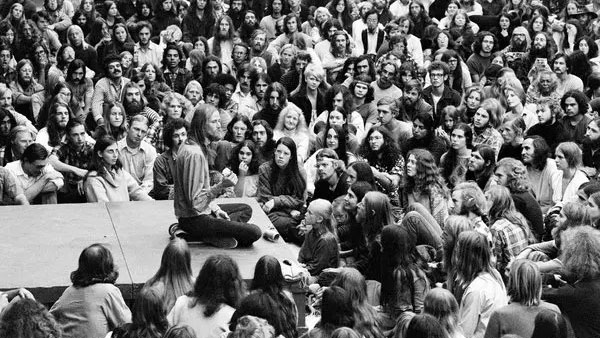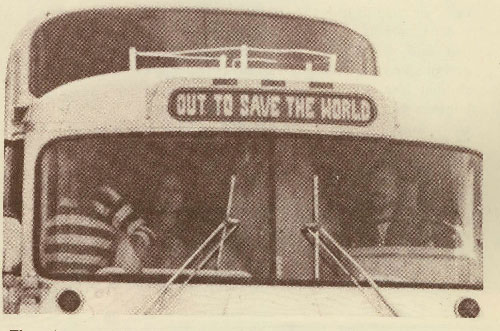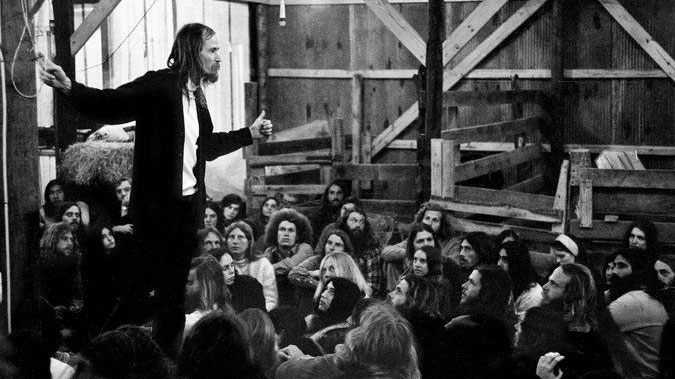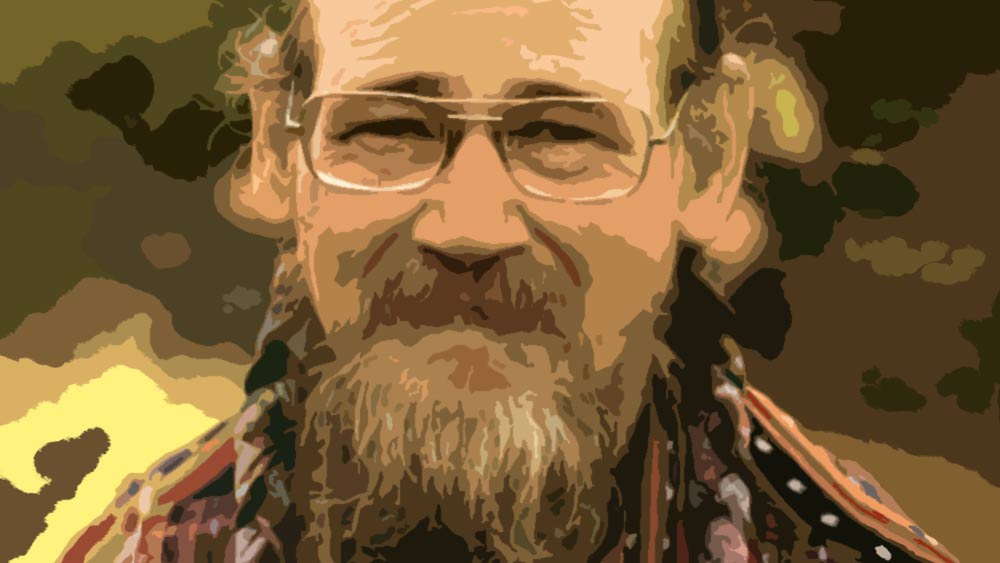In this article we will be paying homage to Stephen Gaskin, a truly benevolent countercultural icon who founded the long-standing commune known as the Farm.
The Formative Years
Stephen Gaskin was born in Denver, on February 16, 1935. At the age of seventeen he joined the US army, and fought in the Korean War as part of the Marine corps.
Upon his return to the States, he began his studies at the San Francisco State University, where he also started experimenting with cannabis and various psychedelics. Once his studies were finished by the mid-1960’s, he became an English and creative writing instructor at SFSU.
After his contract with the literature department ended in 1967, Gaskin started an informal series of private lectures around San Francisco, which would later be known as “Monday Night Classes”.
The overtly eclectic style of his lectures rapidly garnered the approval of the burgeoning counterculture, and soon after, more than 1500 people visited every Monday Night Class.

In these seminars, Gaskin discussed an immensely wide range of topics, including Buddhism, Christian gospels, thoughts on Tantra, telepathy and analyzing the philosophy of Aldous Huxley, to name a few.
He openly encouraged consciousness expansion, both with and without “outside help”, and often joked that his primary skill laid in the ability to talk intelligently while stoned considerably longer than other people.
When the liberal Christian ministers (part of the American Academy of Religion) saw how positively the youth of San Francisco perceived him, they offered him to visit churches around the US in their name and spread his unique message.
The ministers, of course, required of him to refrain from mentioning cannabis and other questionable substances, and Gaskin was quick to accept their offer.
Once word spread that he would “tour” across the United States, many of his acolytes wanted to join him on this unusual voyage. Stephen had no problems with it, but required everyone to pay for their own way.
In October 1970, a caravan of 25 school buses and numerous vehicles embarked on a tour of 42 states. Gaskin’s bus had a typically hippie motto above its windshield – “Out to save the world”.

The entire adventure had a very eye-opening effect on the participants, as the caravan mostly consisted of semi-bourgeois English majors with minimal practical life experience.
Life on the road brought many hardships their way, but most of them found the journey more fulfilling than any prior endeavor. Once the tour was finished, Gaskin and his followers were uncertain of what should come next.
After a long brainstorming session, the group decided to purchase a piece of land in Tennessee, and that’s how their commune first came to be.
The Farm
In 1971, 80 vehicles with 320 people made their way from San Francisco to rural Tennessee, where the group purchased about a thousand acres south of Nashville, for a very low price of $70 per acre.
Once the purchase was complete, the commune slowly took shape, giving birth to “The Farm”.
At first they only used tents, but as time passed by, the families moved into freshly built houses.
The Farmies (as they call themselves) were living a very simple life, pooling their assets and taking vows of poverty. Vegetarianism was obligatory, and soy-based foods such as tofu were the norm.
They also held physical labour at a high standard, relating it to a form of meditation which they dubbed “plenty of work”.
Alcohol, tobacco and man-made psychedelics like LSD were banned, while cannabis and natural psychedelics such as psilocybin mushrooms were permitted.
Gaskin continued his preaching tradition, and the “sermons” took place every Sunday morning.
In order to join the Farm, new members had to take a vow of poverty, turn over their belongings to the collective and accept Gasking as their teacher.
While Gaskin was on a short tour with the Farm Band (where he briefly served as a drummer), the remaining members of the commune built a somewhat lavish house for him to live in.
Once he returned, he was furious with his disciples for making such a luxurious residence and refused to live in it, which greatly solidified his status as their spiritual leader.

As the commune grew, people started having babies born on the farm, and Gaskin’s wife Ina May and a couple of other female Farmies learned to serve as midwives.
The Farm’s midwifery team eventually started offering their services outside of the commune, participating in over 2,500 births.
The unorthodox lifestyle attracted many tourists to visit the Farm, which at the height of its power had over 10,000 guests per year.
The Arrest
In 1974, the police were alerted that certain members of the Farm were playing flutes to cannabis plants in the nude.
They came to inspect, and indeed found several plants on their property. As every real leader should, Gaskin took full responsibility. He was sentenced to three years in prison, even though 600 people signed a petition protesting the severity of his punishment.
He was paroled after one year, and upon his release he filed a lawsuit to get his voting rights restored.
This case ultimately led to the ruling of the Supreme Court to restore voting rights to more than 250,000 people in Tennessee.
Farm Businesses
Unlike most communes, the Farm also possessed a truly entrepreneurial work ethic, although it came as a result of wanting to get out of debt. Farmies developed several stand-alone businesses from the ground up.
They created a book-publishing company, which had a couple of high-grossing titles. Their book company published “The Big Dummy’s Guide to CB Radio” in 1976, which greatly capitalized on the amateur CB-radio craze during the 70’s, selling over a million copies.
Gaskin’s wife Ina May wrote two books, “Ina May’s Guide to Childbirth” and “Spiritual Midwifery”, which sold over 500,000 copies. Another hit was “The World of Satellite Television”, offering instructions on how to install a personal satellite dish.
The commune also produced and marketed sorghum syrup under the name “Old Beatnik Pure Lewis County Sorghum”.
Last but not the least, the pivotal Farm business is Solar Electronics, which produced photovoltaic solar panels and hand-held geiger counters, which detect radiation levels.
Farm Humanitarianism
Even though Farmies were completely self-sufficient, they haven’t forgotten about the outside world. Soon after Gaskin’s release from prison, the Farm launched Plenty International, an environmental, humanitarian and human rights non-profit.
Plenty performed a great number of charitable actions, including dispatching volunteer ambulance services in the South Bronx and on an Indian reservation in the state of New York, started a lunch program for schools in Belize, and an agricultural training program in Liberia.
They’ve also shipped rations to Haiti and Honduras, and were among the first volunteers to come to New Orleans after Hurricane Katrina.
The action that had the biggest impact happened in 1976, after a catastrophic earthquake hit Guatemala resulting in total havoc and 23,000 casualties.
Gaskin and a few other Farm residents went to Guatemala equipped with toolboxes, and with the help of volunteers built over 3,000 homes and 300 public buildings over the course of several months.
They later mentioned that the experience of building the Farm from scratch served as perfect training for this particular mission.
Plenty International received a Right Livelihood Award in 1980, a prestigious humanitarian award presented by the Swedish Parliament, often referred to as the “alternative Nobel Prize”.
Stepping Down
After so much charitable work across the globe, numerous members of the community felt that they were giving too much, while Farm’s offspring lived in almost third-world conditions.
In 1983, while Gaskin was away on another humanitarian action, the commune voted to become a democratic society, and to remove him as their selected leader.
He accepted the new terms without any hassle, and continued to live with his wife Ina May on the Farm until his death in 2014. He died of natural causes at the age of 79.
Gaskin and his Farm showed the world that you could be free-spirited, self-sufficient, entrepreneurial and conscious all at once.
His legacy endures as the Farm withstood the test of time and continues to thrive to this day.







Fayette Hauser February 15, 2020 at 10:45 pm
Great article. I used to go to his Monday Night Class. He was brilliant and much needed in the Society of the Haight. He was a revered teacher.
Marco Medic February 18, 2020 at 9:25 am
Thank you for sharing Fayette, must have been an amazing time 😏
Yana March 2, 2021 at 7:14 pm
Hi Marco, I am so delighted to find your article on Steven and the Farm. We heard about him and the Farm in Berlin/Germany in the early 70 and I would have loved to visit and would quite likely have stayed. Instead I moved to New Zealand 1979 to start community here. We loved and used their book 'spiritual midwifery' and when I heard that Steven and Ina May would come to our Nambassa festival in 1981 I made sure I would be there, under difficult circumstances and highly pregnant I made it and found my midwife for my 3rd homebirth there. The spirit of generosity, caring, inspiration, joy, depth imbued the whole event and my most amazing birthing. With deep gratitude and delight, Yana
Marco Medic March 3, 2021 at 10:26 am
What a magnificent story. Thank you very much for sharing it with us Yana, and I hope you are doing well.
Pete August 11, 2022 at 4:24 am
Steven Gaskin his wife & the farm set a great example for the future of intelligence on the planet. Sadly I traveled to the gate of the Farm in the 70’s only to turn and leave.
Steven October 13, 2022 at 11:40 pm
I went to the farm in 71. I had an experience. An extra helping of juice that was a oneness I didn’t understand at the time until I read one of Stephens books. The time he approached a be in that gave him watery knees. I got fed and left because at the time it was too much. It’s a global farm if we want it to be. Truth brothers and sisters. I went back 22 years later. Yeah, they’re technicolor amash with very little juice, but that’s all right. They mean well. Love and Peace!